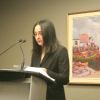As a former teacher, curriculum developer, university professor, and researcher of rural realities in five of Canada’s provinces, I have faced each of Dr. Glaze’s recommendations concerning school administration.
While some are well placed, the essence of change is towards further bureaucratization of a complex system. For instance, dividing administrators from teachers creates an often unhealthy “us and them” atmosphere, and it dangerously impedes the movement of educators between classroom and admin office. As well, consolidation of school boards spells less, rather than greater, communication between central offices (Halifax in this case, I assume) and rural communities. And consolidation elsewhere has not realized the promise of monetary savings.
But my main concern is that, in search of a simple answer to a complex situation, we once more blame teachers who too often face overcrowded classrooms, disruptive students (with inadequate teacher assistance), and school policies that permit tardiness and ignored assignments. Of course we have, and have had always “weak teachers,” but we also have weak administrators. Contributing to both categories are the truncated courses we now provide for educators-in-training. University courses which 30 years ago ran for an entire term of 12 weeks, are now ‘successfully’ covered in 11/12 consecutive teaching days. The rationality is that students receive the same number of contact hours with their instructor. The reality is that students have little opportunity to read, reflect, discuss, write and digest critical feedback.
Each school’s performance can be improved and most teachers and administrators are working diligently towards this goal. But to tackle the underlying problems, we must look to the quality of educator preparation and available inservice. We must work ‘with’ and not ‘on’ teachers; their input, along with that of administrators and university representatives, is essential to success.
Dr. Carol E. Harris
Professor Emeritus, Leadership Studies, University of Victoria
Adjunct Professor, Acadia University




In some cases I think there are opportunities for students but the onus may be on them “to read, reflect, discuss, write and digest critical feedback.” My daughter attends the University of Alberta in Edmonton and belongs to a “think tank” where they meet a couple of times a week to discuss social issues.
Exactly Steve. And that’s why we must bring the universities into the conversation. Their programmes should do justice to the needs of the province and, in my opinion, that includes critical thinking for all educators — and, I repeat, critical thinking takes time to reflect, discuss, write, etc. … Institutions of learning are not “businesses”; they can cut just so many corners in the name of efficiency. At this stage, we need to attend to the truncated courses that are currently offered by most universities in this era of austerity. (I refer here, of course, to the handing over by the feds — in the early 1990s — of funding to provinces and, then, to institutions and, ultimately, to students.)
I’m curious to know if your daughter is a full-time student, enrolled in coursework over the full term. Or does she work a full-time job and limit her studies to extremely short summer courses? If the latter, my argument applies. If the former, she is fortunate and will probably find great richness in her pursuit of knowledge and her reflection on its present day relevance to social, economic, cultural and political issues.
The Glaze Report, although applying many administrative tactics found in other provinces, including AB, applies to Nova Scotia, not Alberta.
Thank you for joining the conversation. Carol
Yes, she attends full-time. Besides the think tank, she does volunteer work at the University Hospital. Unless she changes direction, she wants to get a doctorate degree in Psychology. This is her first year. She is doing well. She’s leaning a bit towards something with more science, and may change her mind yet. I don’t know… she enjoys learning and debating social issues too.
Her professors sure seem to cram a lot into the semesters and a lot of it is homework. They make themselves accessible through an online portal and offer special review classes as study aides before mid-terms and finals. As my daughter found out on the night before one of her finals, the prof addressed something she wasn’t clear about via text messaging. They certainly seemed committed to their students success.
Still, I agree that if the semesters were a little longer and a little slower pace, it would offer more time and opportunity to delve into a variety of topics that could help round out their education a little more.
Thanks Steve. As a former prof, I love to hear of young, keen students and their progress. Your daughter, I’m sure, has embarked on an exciting journey of learning. Please know that, in my initial blog, I was referring to very short summer courses that are fast becoming the norm for education students. Part of the problem stems from the changed administrative (and financial) conditions of higher education in Canada. As (very) short courses become ‘normalized’ for universities (administrators, faculty, and sessional instructors), they also become acceptable to teachers seeking post secondary courses (and higher qualifications). We use the rationality of greater accessibility, and this is certainly the case for many students. However, apropos truncated courses, students continue to pay the same tuition fees for far less instructional content. As this becomes the ‘face’ of education, schools, communities and students suffer. The problem is immense, but the conversation about it should begin immediately. It was not acknowledged, however, in the recent education report that, instead, zoomed in on school boards and “weak” teachers.